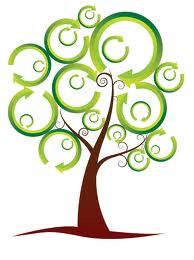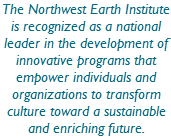You are currently browsing the tag archive for the ‘waste reduction’ tag.
Last week Portland’s Oregonian newspaper shared the following story on NWEI volunteers Betty and Jon Shelley via OregonLive. Read on to learn more about how the Shelleys have managed to reduce their trash output to one can of garbage in 16 months! For the full story, click here.
Taking 16 months to fill one 35-gallon can with trash is the best the Shelleys have done so far in reducing their waste.
They wrote no blog chronicling a year of sudden, anti-garbage inspiration with panicked Styrofoam-meat-tray-crinkly-cereal-box-liner moments. Instead, their effort to cut back on waste started slowly more than 20 years ago with the question: Where is “away” when something is thrown away?
That led to habits Jon Shelley says now come as naturally as breathing, making their feat not much trouble at all. But how does someone else get to that point?
A recycling information specialist at Metro, Betty Shelley heard that question enough she decided to teach a three-part class on reducing waste. In “Less is more: Getting to one can of garbage a year,” she details her many habits and explains how, most importantly, she carefully considers what she brings home, asking, Where will it go when it’s used up, served its purpose or breaks? Because while recycling matters, reducing consumption reigns.
The Shelleys don’t have curbside service of any kind for trash, recycling or compost. She estimates they save $400 annually on garbage alone. Recycling goes to Far West Fibers. Vegetable peels get composted in the backyard. They eat meat as something other than a main course roughly three times a week, and what few bones exist (she usually buys skinless boneless chicken breasts) go in a bag in the freezer…So now, every six months a neighbor composts the bones in exchange for cookies.
In her tidy Southwest Portland kitchen, Betty Shelley has an organized system under the sink. A paper grocery bag marked 11/13/12, the most recent starting date, holds the garbage, which is neatly flattened and will eventually get packed tight as a brick. Another paper bag contains paper recycling. A smaller bag contains ferrous metal such as steel and iron. And another contains nonferrous metal such as aluminum.
No more paper towels
Because they buy staples such as rice, honey, syrup, quinoa, oats, corn meal and beans in bulk, they don’t have much packaging to recycle. The Shelleys’ first big change was to stop using disposable paper napkins, towels and plates. Betty tells those in her class they can use cloth napkins multiple times before washing them with other items so they don’t require a separate load.
“We gradually noticed our garbage was less and less and we found other options for things you would throw away,” she says. So they dropped to monthly garbage service. In 2006, they got it down to one can a year.
Not only did they curate what they took in, but they also found creative ways to purge: rubber bands from produce went to a nearby elementary school and candle ends to Scrap, a Portland environmental nonprofit…
The Shelleys continually assess how they can go greener. They reused the pipes from a rooftop solar water heating system as deck fencing. Slate stones unearthed from their backyard are now pathways around the house and cemented to the foundation as decorative trim…Her latest habit: She carries a takeout container in the car for leftovers.
And a favorite point is this: “People don’t realize they’re role models for others. They think someone big and important has to be a role model — a celebrity or intellectual.”
For the full article and tips for reducing waste, click here.
Pat McGovern, a New Hampshire Localvore and blogger about the Localvore Movement in the Upper Valley region of New Hampshire and Vermont recently told NWEI she decided to continue her waste reduction NWEI EcoChallenge. “It was a good consciousness raiser,” she said. Pat shared this list of helpful tips she has been implementing in her efforts to reduce waste:
- Plastic bags and small glass jars can go in your shopping bags for buying in bulk (tamari, peanut butter, walnuts, coffee, granola, sesame seeds, corn meal, flour, spices, dish detergent).
- Use cloth napkins at home and don’t buy bottled water or soda. Rely on a stainless steel water bottle when away from home.
- Don’t buy plastic wrap or aluminum foil. Use glass storage containers for leftovers.
- Don’t buy food or beverages in cans (and avoid the BPA to boot).
- Bring your own container for leftovers when dining out.
- If possible, purchase milk from a local dairy that uses returnable bottles.
- #5 plastic can go to Preserve Products for making toothbrushes, razor handles, etc. (Many grocery stores have a drop off station).
- Consider composting worms to compost your vegetable peels, egg shells, toilet tissue tubes, cardboard cracker/cookie boxes, and restaurant napkins.
Pat notes, “A focus on local foods has definitely reduced my trash – I eat mostly whole foods – thus waste is mostly compostable. I have not yet solved the problem of plastic wrap around cheese or tofu, the plastic bags from bread, tortillas and English muffins (I bring them to the community garden for folks to carry their harvests home, but that only postpones their trip to the waste stream) or what to do with milk bottle caps and tortilla chip bags. I have started an album on my facebook page showing creative ways to keep trash out of the waste stream. I am also becoming more aware that trash reduction starts at the point of purchase!
I think the EcoChallenge is a great idea to activate folks and am looking forward to working with Barbara Duncan and NWEI’s partner organization Catamount Earth Institute in Vermont to organize EcoChallenges here in the Upper Valley.”
Pat also notes that foil tea bag non-recyclable wrappers were a source of trouble during her EcoChallenge (Pat enjoys Ginger Tea). A recent trip to the farmers market however allowed her to discover local ginger root. “I am now making my own ginger root tea. No waste!” Click here for her ginger tea recipe.
Thanks for your inspiration, Pat!
 This week KOIN Channel 6 reported on a how the NWEI EcoChallenge impacted one Portland family who took on a waste reduction challenge. The entire Tust family took on the EcoChallenge, each choosing a different action to focus on for the two week period.
This week KOIN Channel 6 reported on a how the NWEI EcoChallenge impacted one Portland family who took on a waste reduction challenge. The entire Tust family took on the EcoChallenge, each choosing a different action to focus on for the two week period.
Robert Tust reduced his shower time to 2 minutes a day and Meghan Tust chose trash reduction as her challenge, reducing packaging waste and buying more bulk foods at the store (she also eliminated disposable sandwich bags). Even five year old daughter Kaia Tust took on the EcoChallenge, reducing paper use for her arts and crafts and “saving trees” by only using recycled items for her art projects.
Watch Channel 6’s coverage of how this family’s EcoChallenge reminded them that “small changes do make an impact.”
For the short video, click here.
The 2012 EcoChallenge is fast approaching! The EcoChallenge is an opportunity to change your life for good. For two weeks every October, the Northwest Earth Institute challenges you to change one habit for Earth. You choose your challenge (water, energy, food, transportation or trash), we connect you with other EcoChallengers, and collectively we prove that small actions create real change.
Watch this short video of Sarah discussing her trash reduction EcoChallenge for ideas and inspiration and sign up today at www.ecochallenge.org.
We hope you will join us!
“Since 1900, US population has tripled but use of materials has increased 17-fold.”
-David Wann
Would you like to reduce your waste and your impact on the planet?
Long time NWEI volunteer Betty Shelley will be offering her three-session “Reduce Your Waste, Reduce Your Impact” class at the Northwest Earth Institute office for three consecutive Tuesdays, beginning Tuesday April 17th from 6:30 to 8:30. The class will deal with solid waste/garbage, but will also touch on reducing water, energy, and other resource use.
The format is interactive with the goal of engaging participants through discussion and assignments to explore their actions and behaviors, and learn ways to make lasting changes. Learn Betty’s techniques and share your own.
The number of participants needed is a minimum of eight and a maximum of twelve. The $25 fee (cash only) is due in full at the first meeting. Please share this with anyone you know who is interested in making a commitment to reducing their impact.
*To register, contact Betty  directly at 503-244-8044 or via email: greenhouseone@gmail.com
directly at 503-244-8044 or via email: greenhouseone@gmail.com
“It was great to talk to other people about their efforts to reduce, reuse and recycle. Just going to the class made me feel great and inspired to take more action.” Barbara
“Even knowing as much as I know, I still learned quite a bit that I take and use at home and in my business.” Lane’
“The activities and lecture portions were just short enough to keep people interested. The small tips had the best impact for me.” Jessica
 One of NWEI’s long time volunteers, Betty Shelley, will be offering a “Reduce Your Waste, Reduce Your Impact” class beginning Tuesday February 7th – hosted at the NWEI office in Portland. Alarmingly, since 1900 the US population has tripled but use of materials has increased 17-fold (from David Wann’s Simple Prosperity). If you would like to reduce your waste and lessen your impact on the planet, this class is for you! Below is information from Betty regarding the class:
One of NWEI’s long time volunteers, Betty Shelley, will be offering a “Reduce Your Waste, Reduce Your Impact” class beginning Tuesday February 7th – hosted at the NWEI office in Portland. Alarmingly, since 1900 the US population has tripled but use of materials has increased 17-fold (from David Wann’s Simple Prosperity). If you would like to reduce your waste and lessen your impact on the planet, this class is for you! Below is information from Betty regarding the class:
I will be offering my three-session “Reduce Your Waste, Reduce Your Impact” class this winter at the Northwest Earth Institute office beginning Tuesday, February 7th from 6:30 to 8:30pm. The class will deal with solid waste, aka garbage, but will also touch on reducing water, energy, and other resource use. The format is interactive with the goal of engaging participants through discussion and assignments to explore their actions and behaviors, and learn ways to make lasting changes. Learn my techniques and share your own.
*To sign up for the class, either email or call no later than January 31st. The number of participants needed is a minimum of eight and a maximum of twelve. The class will be cancelled if fewer than eight sign up. The $25 fee (cash only) is due in full at the first meeting.
Please share this with anyone you know who is interested in making a commitment to reducing their impact.
Betty Shelley 503-244-8044 greenhouseone@gmail.com
“It was great to talk to other people about their efforts to reduce, reuse and recycle. Just going to the class made me feel great and inspired to take more action.” Barbara
“Even knowing as much as I know, I still learned quite a bit that I take and use at home and in my business.” Lane’
“The activities and lecture portions were just short enough to keep people interested. The small tips had the best impact for me.” Jessica
Download the class flyer here: BettyShelleyWasteReductionClass





